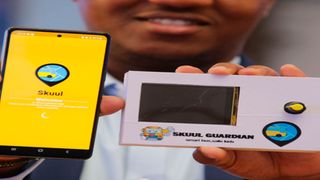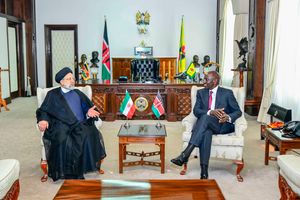
Ian Mwangi displays the Skuul App on a smartphone.
Enterprise
Premium
This app keeps track of your child’s school transport
What you need to know:
- The app functions within distinct time frames, early morning and late afternoon when the bus is within a five-kilometre range.
- Since January of this year, the app has been tested in a pilot programme with five schools and private providers in Nyeri.
For many, the sight of children braving the cold, sometimes alone, awaiting school buses in the morning may seem unremarkable because it is commonplace. For Ian Mwangi, however, it is a compelling call to action.
The 26-year-old tech lover has innovated a phone application named Skuul App, which allows parents to track the whereabouts of their children’s school buses. The app functions within distinct time frames, early morning and late afternoon when the bus is within a five-kilometre range.
“From 6am to 9am and again from 3pm to 6pm, parents can trace the bus’s location, receiving notifications as it enters the five-kilometre radius,” he explains.
The idea of the app came from a casual chat between him and his longtime friend, and now co-founder, Cyrus Githii, a father of two. Both felt a growing concern about pupils enduring prolonged waits for their school rides. For Ian, such a sight was all too familiar in his home at Ring Road Estate in Nyeri town.
In September 2021, under their company, Kesho Labs Limited, the duo initiated the app’s development, collaborating with a group of engineering students from Dedan Kimathi University. Ian, a self-taught programmer, says that they turned to the engineering students’ proficiency to design the app.
Initially, the idea was to create two separate mobile applications, one tailored for the parents and another for the school drivers, much like the dual-app system in taxi-hailing services. However, this approach proved a challenge when they tested it out in a pilot program with two schools in Nanyuki.

Ian Mwangi during the interview in Nyeri on October 3, 2023. He is the co-founder of the Skuul App.
“Some school bus drivers struggled to use the mobile app while others did not even own smartphones, forcing us to buy for them,” he says.
Their experience painted the potential hazards of phone usage while driving, more so for a significant portion of school drivers who are middle aged and find tech a challenge. After a few weeks, they revisited their strategy. This time round, their focus shifted to creating a device that would minimise the driver’s need to interact with his phone.
“We developed a gadget that captures the bus’s location and relays the data to the Skuul app for real-time tracking,” says Ian.
Acting much like an interactive map, the gadget guides the driver to precise pick-up or drop-off spots for the children.
The automated device, fitted within the school bus, has coordinates that alert parents when the bus is within a five-kilometre vicinity. Worth noting is that the app allows parents to adjust this alert proximity as many times as needed, as long as it is below five kilometres.
He explains that their innovation permits parents to monitor the vehicles within a designated timeframe because many schools have reservations about granting unrestricted access for their vehicles to be observed round the clock.
Since January of this year, the app has been tested in a pilot programme with five schools and private providers in Nyeri.
“These participants have been providing us with valuable feedback and suggestions, helping us refine and optimise our services,” says Ian.
To facilitate the app’s use, his company typically integrates the schools or private service providers into the app. This, in turn, allows the school to include their buses and assign parents based on their children’s routes and the specific bus they use.
“This is the reason why we create accounts for parents. We, thereafter, send them a link along with a first-time password,” Ian explains.
A parent can then configure their individual settings upon accessing the account, by registering using their phone numbers and email addresses. They are also required to specify their location so that they receive alerts.

A tracking gadget that is usually installed in a school bus and connected with the Skuul App, which notifies parents their children's school buses.
The pilot program in Nyeri ends in December, but from next year, the company plans to introduce an affordable fee for parents, which will be paid through the schools, either on a monthly or per-term basis.
He aims to expand his reach to encompass major towns and cities, citing large cities like Nairobi that face unpredictable traffic and accidents making it challenging for parents to accurately gauge the bus’s arrival time.
“Such uncertainties can leave parents waiting in anticipation. For such parents, the convenience of tracking school vehicles from the comfort of their homes proves invaluable,” he says.
They can also now spend that waiting time bonding with their children or preparing for work. Although he explains that introducing a new product has brought its own set of challenges.
“When approaching schools, many have shown hesitation in using the gadgets in their buses although there are few who understand its intended functionality,” says Ian.
He adds that while the app was developed in a relatively short frame, they faced challenges with the gadget due to multiple required modifications to ensure its proper functioning.
Besides that, the company had to outsource some of the gadget’s parts from China because the local landscape presented its own set of challenges as there were very few companies capable of developing the gadget, and those available charged exorbitant prices.
It cost Sh1 million to develop the app together with its accompanying device, and the company has applied for patent rights to protect the innovation.





